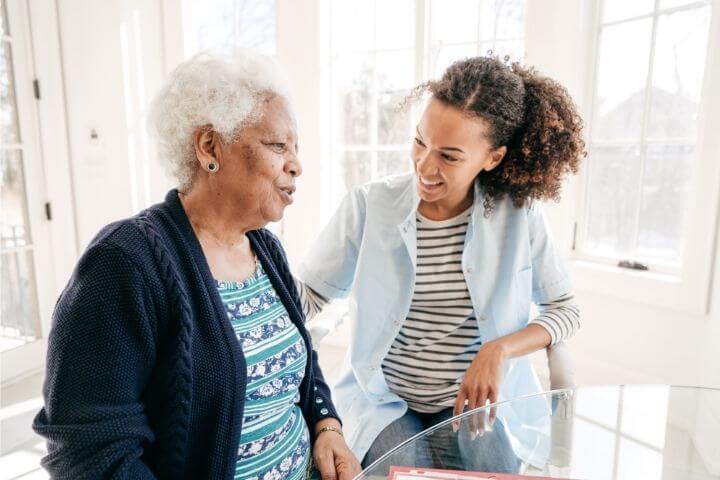Alzheimer’s and dementia are both progressive diseases, and anyone diagnosed with them will have their symptoms become worse over time. Now, for some people they will progress will quickly and they could become a very different person in just a year. While others may develop symptoms slower and could be much more independent for longer.

Regardless of the rate at which these diseases progress, eventually everyone who is living with either of these illnesses will need more care and may not be able to live on their own or provide basic care for themselves (like bathing, dressing, preparing meals or even remembering to take the medications they need to take).
If someone close to you has been diagnosed with this illness, you may find yourself wanting to prepare for what’s coming and how you can best get ready for the kind of care they may need in the future. At one point, they will likely need around the clock care – even if they don’t want that to happen.
Contents
What You Can Expect in the Early Stages
If you haven’t had any kind of experience with someone who is living with Alzheimer’s or dementia, the early stages of these illnesses can be very overwhelming and eye-opening.
The early stages is usually referred to as “mild Alzheimer’s” and is not the same as early on-set (as that diagnosis is correlated to the patient’s age when diagnosed, not their current cognitive abilities).
Many people when in this stage don’t actually know they have the illness as the symptoms are not always super obvious.
Common symptoms in mild Alzheimer’s or dementia can include
Forgetfulness
As many people are older when they are diagnosed, forgetting small details or conversations can be seen as a normal part of aging and it may not be a red flag that something is wrong.

Difficulty Following Conversations
If your loved one just sits there and kind of zones out when people at the table are talking, and they don’t really participate in conversations this can be an indicator something is wrong. This may also present by way of them asking you to repeat things several times or not being able to understand what you’re saying so you have to explain it in a number of different ways.
Co-ordination Problems
If your loved one is stumbling a little or having a hard time finding their footing this can be a sign of mild Alzheimer’s or dementia, but this can also be a sign of aging with difficulty in walking or standing so again it can be hard to detect early on as a real issue.
Radical Mood Shifts
Is your loved one usually really happy and outgoing, but suddenly they seem to be depressed or apathetic? Sudden mood changes like this are usually easier to spot as it’s not a normal sign of aging, and are very obvious.
Depression can be common in the elderly, however it’s usually gradual when they are isolated from their friends and family instead of radical changes.
When people are in these early stages of the disease, they often only need a little help or they know that they may be struggling so they have learned how to compensate for these deficits.
For these reasons, detecting these illnesses early on can be very difficult. Many people who are living with these symptoms will refuse care as many of the symptoms are considered to be normal signs of aging and they may not realize they really need to get medical help.
The Middle Stages of Alzheimer’s and Dementia
As someone with either of these illnesses starts to progress, their symptoms will become worse but there isn’t a timeline that will work for everyone. The symptoms will progress at different rates for everyone, and it’s really an individual disease.

Those who are in the middle stages of this illness will need more care than when they were in the early stages. During this time, they may be able to stay in their own home with caregivers coming in and out at certain times to help with bathing and preparing meals or giving medications.
There is a possibility, though, that someone even in the mid-stages will need full-time care as it’s such an individual illness and there’s no clear and definite line to draw on how much help someone will need.
Additionally, if your loved one lives in their own (as opposed to having a spouse or a child who lives with them full-time) it can make a really big difference in whether they are able to live there or need to move into a long-term care home.
The Late Stages of Alzheimer’s Dementia
As someone moves into the later stages of these illnesses, they often become unable to verbally communicate their needs or even attend to their needs on their own.
During this stage, nonverbal communication becomes so important to make sure they are getting the care they need and are comfortable with the people who are caring for them,
In the late stages of this illness, a person may experience symptoms like
Severe Memory Impairment
This symptom may even make it so that people who have the illness don’t even recognize their own spouse or children. They may also not be able to process new information – like moving into a long-term care home – or accepting new people into their lives.
They may get very emotional and upset when they don’t know where they are or know the people around them as everything is very confusing for them.
Inability to Speak
As mentioned, a person with advancing Alzheimer’s or dementia may not be able to verbalize their wants or needs, partially or entirely.
For this reason, finding ways to communicate with them will become increasingly important. Even if they can’t verbalize what it is they want, they still need to be respected and make sure they are treated with dignity.

Unable to Feed, Bathe or Dress Themselves
As this disease progresses, basic everyday tasks may become impossible for someone to perform. They will need help taking care of themselves for even the most basic of tasks,
This may be something you are comfortable doing, or you may be looking to bring in someone to help you care for your loved one in ways you just cannot.
Suggesting Full-Time Care For Your Loved One
As the symptoms progress, your loved one may not be able to continue to take care of themselves and they may become dangerous to be left to live alone. On top of this, they may not be eating properly or taking the right medications at the right time so their overall health is suffering.
For the first stages of an illness like this, you may be able to have someone come in to provide home care for your loved one. This can help when they just need a little extra help around the house – maybe with cleaning or running errands – and they are generally safe to be living on their own.
You’ll notice that things will get worse over time, and you will need to talk to your parent about looking into some additional care – including the possibility of moving into a long-term care home.
Naturally, your parent may refuse to do this as they don’t want to accept that something is really wrong and they are losing their independence. So refusal of help or care is going to be something that you will need to be prepared for.
What to Do When Care Is Refused
You never want to force anyone to do something they don’t want to do, especially when they are already facing and dealing with a very overwhelming illness.
Your loved one may not recognize anyone around them, or their surroundings. In such a scenario, it is likely they are going to refuse care. They don’t want to go somewhere that they don’t know or don’t know who will be caring for them.
Depending on how advanced the symptoms are for your loved one, you may be able to have a conversation with them about the reality of their situation. You should try to discuss this with them on a day when they are fairly lucid so that they can grasp what is going on (as much as possible).
If your loved one has designated someone as a power of attorney to make their medical decisions, this person may have to exercise the power to have them committed to a long-term care facility.
Of course, this is the last thing anyone wants to do with their loved one, and you don’t want to make them feel uncomfortable or like they are not included in decision making about their own medical care.
As much as possible, make sure you are including them in the decisions. For example, taking them to see different long-term care homes and see if there is one that they liked more than others.
It will be difficult when an elderly parent refuses care – especially when it’s full-time care that’s needed. But try your best to make them comfortable and make sure they know they are really included in decisions for their own care.
